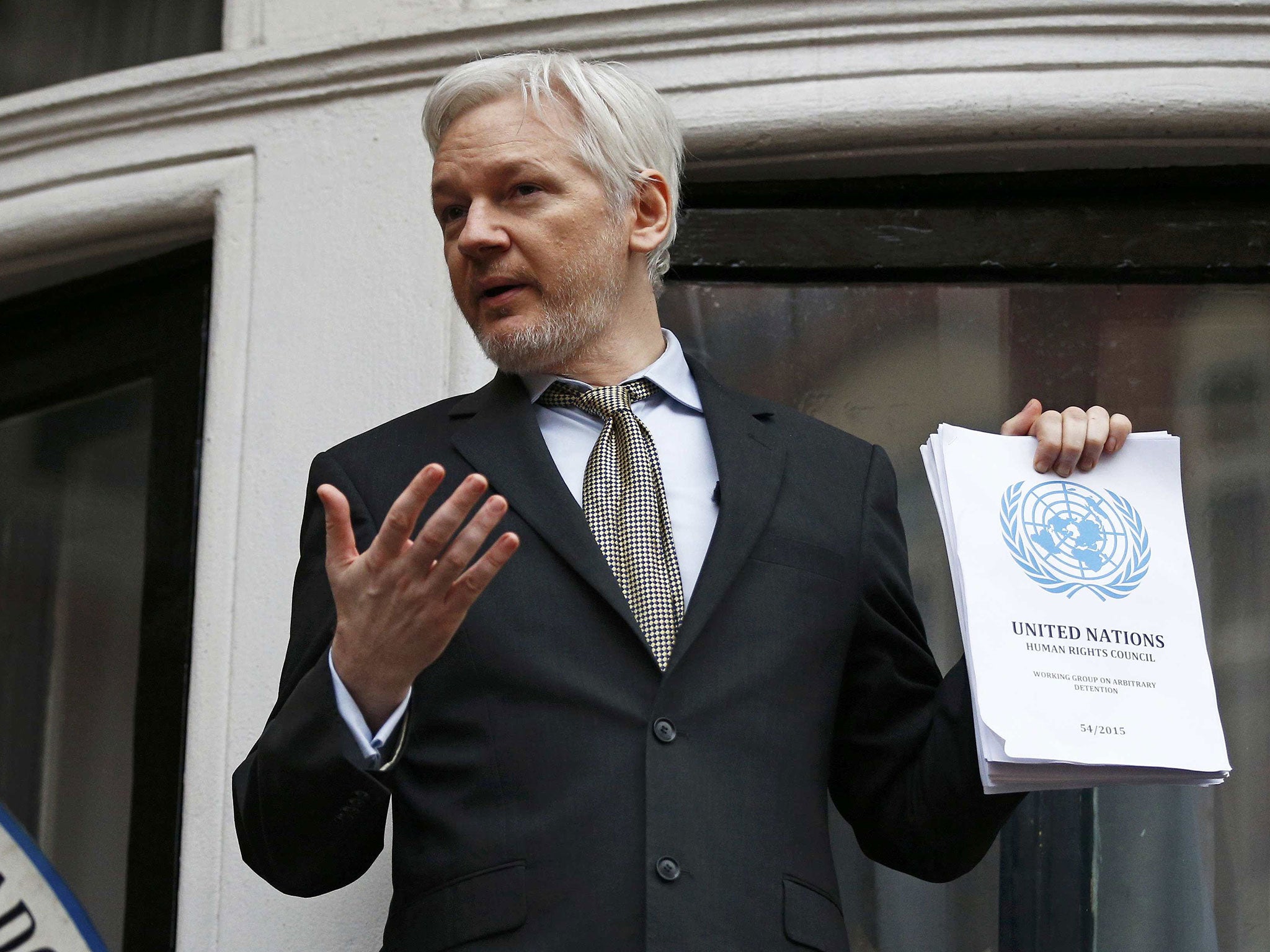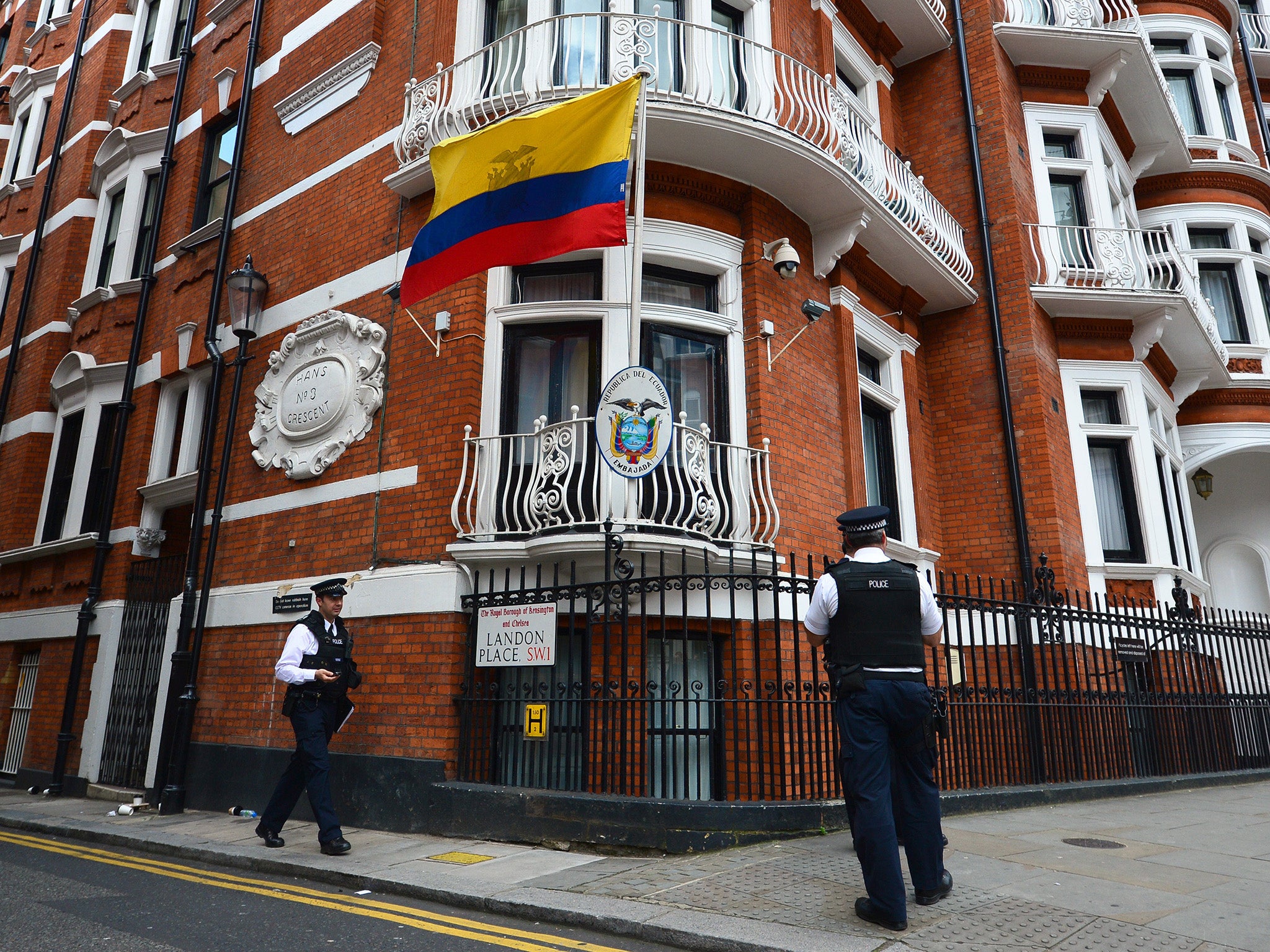Julian Assange makes rare appearance on embassy balcony calling for 'illegal, immoral, unethical detention' to end
Wikileaks founder said the parties responsible for his detention will face 'criminal consequences' if it continues

Wikileaks founder Julian Assange has made a rare public appearance on the balcony of the Ecuadorian embassy to demand an end to his "arbitrary detention" after a UN group concluded that he was being held unlawfully.
The Australian journalist has been holed up in the embassy since 2012 to escape deportation to Sweden for questioning over rape allegations.
Mr Assange and his supporters say the extradition request is a ploy by the US authorities to extradite him to America to face possible detention and torture over the Wikileaks revelations in 2010.
Addressing his supporters and journalists outside the embassy in Kensington, London he said there will be "criminal consequences" if his "illegal, immoral, unethical" detention continues.
Mr Assange entered the embassy voluntarily to claim asylum but will be arrested immediately if he leaves.
It comes as the UN Working Group on Arbitrary Detention concluded that the UK and Swedish governments should end what they called Mr Assange's "deprivation of liberty" and said the situation was a violation of his right to freedom of movement.
Commenting on the working group's decision UK Foreign Secretary Philip Hammond said the conclusion was "ridiculous" and said it "changed nothing".
Mr Assange said: "There have been comments from Philip Hammond the Foreign Minister [sic] of this country saying 'this changes nothing'.
"Philip Hammond as an individual is a perfectly nice person but we must understand that those comments are merely rhetoric.
"There is no argument in 'this changes nothing', it is not saying the UK is pulling out of the working group or the human rights group or even that it refuses to recognise the results."
He said it "did not come as a shock" to have the "injustice [he] fought to expose inflicted on [him]" but said his detention was unfair on his children who were "innocent parties".
"I’m tough, I am hardened by this process and I can take it however what right does this government or the US government or the Swedish government to take away my children’s right to see their father for five and a half years without any charges in any country", he said.
He thanked the UN working group for their verdict which he said was "binding under international law".
He said: "How sweet this is, this is a victory that cannot be denied, it is a victory of historical importance not just for me, for my family, for my children but for the independent of the UN system".
An arrest warrant for Mr Assange was initially issued in August 2010 after he was accused of one count of rape and one count of molestation.
He was interviewed by prosecutors in Stockholm but denied the charges. In November a Swedish court approved a request to detain Mr Assange for questioning over the allegations and an international arrest warrant was issued.
Mr Assange fought the extradition request in the UK courts and had appeals in the High Court and the Supreme Court rejected.
After the Supreme Court rejected Mr Assange's plea to appeal their ruling he entered the Ecuadorian embassy on 16 June 2012 to claim political asylum which was formally granted two months later.
Mr Assange has claimed a Grand Jury investigation into whether to bring charges against him over the Wikileaks scandal - which saw the publishing of highly classified documents - demonstrates the US wishes to extradite him.

Grand jury investigations are a routine measure in the US justice system to determine whether an offence has been committed and if there is enough evidence to prosecute. The proceedings are kept secret.
Chelsea Manning - formerly known as Bradley Manning - is currently serving a 35 year prison sentence in the US for violating the Espionage Act by releasing the documents to Mr Assange.
The lawyer for the Swedish woman who has accused Mr Assange of rape said the UN panel’s finding was “insulting and offensive” toward her client.
In a statement, Elisabeth Massi Fritz said Mr Assange should “pack his bags, leave the embassy and start cooperating with the police and the prosecutor”.
Join our commenting forum
Join thought-provoking conversations, follow other Independent readers and see their replies
Comments
Bookmark popover
Removed from bookmarks